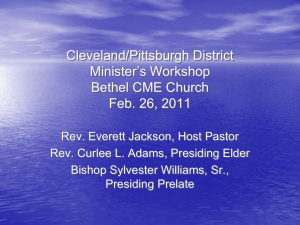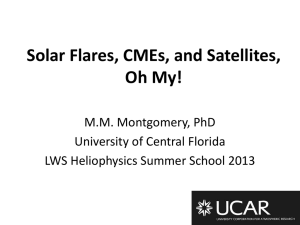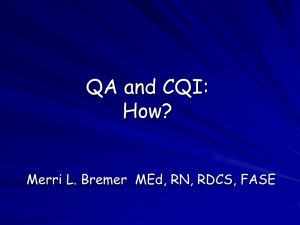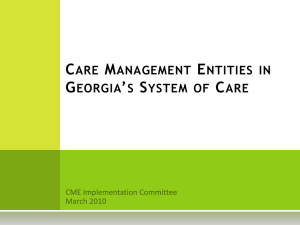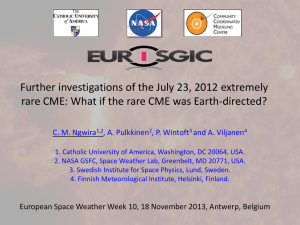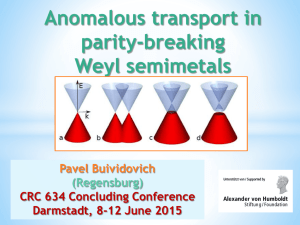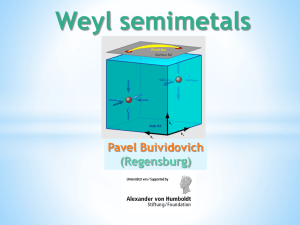anomalous_transport_lat_Mainz
advertisement
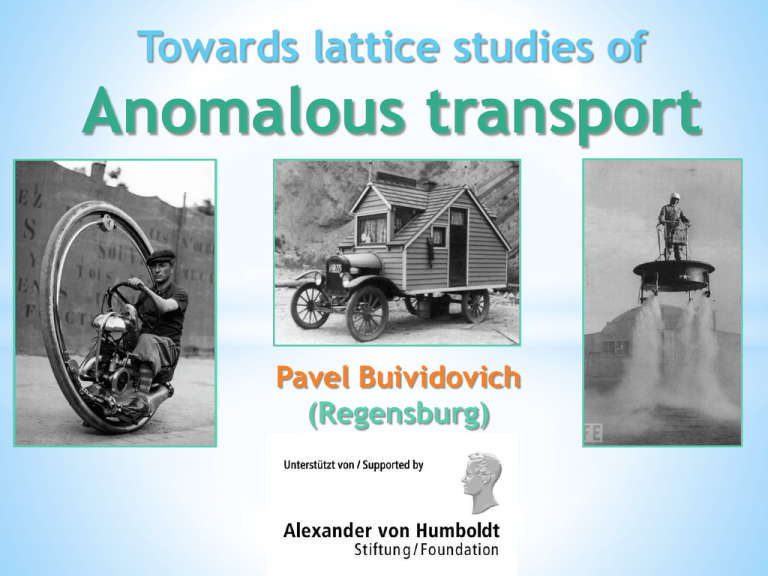
Towards lattice studies of Anomalous transport Pavel Buividovich (Regensburg) To the memory of my Teacher, excellent Scientist, very nice and outstanding Person, Prof. Dr. Mikhail Igorevich Polikarpov “New” hydrodynamics for HIC Before 2008: classical hydro = conservation laws • shear/bulk viscosity • heat conductivity • conductivity • … Essentially classical picture!!! Quantum effects in hydrodynamics? YES!!! In massless case – new (classical) integral of motion: chirality “Anomalous” terms in hydrodynamical equations: macroscopic memory of quantum effects [Son, Surowka, ArXiv:0906.5044] Integrate out free massless fermion gas in arbitrary gauge background. Very strange gas – can only expand with a speed of light!!! “New” hydrodynamics: anomalous transport Positivity of entropy production uniquely fixes “magnetic conductivities”!!! • Insert new equations into some hydro code • P-violating initial conditions (rotation, B field) • Experimental consequences? Anomalous transport: CME, CSE, CVE Chiral Magnetic Effect [Kharzeev, Warringa, Fukushima] Chiral Separation Effect [Son, Zhitnitsky] Chiral Vortical Effect [Erdmenger et al., Banerjee et al.] Lorenz force Coriolis force (Rotating frame) T-invariance and absence of dissipation Dissipative transport (conductivity, viscosity) Anomalous transport (CME, CSE, CVE) • No ground state • Ground state • T-noninvariant (but CP) • T-invariant (but not CP!!!) • Spectral function = anti- • Spectral function = Hermitean part of Hermitean part of retarded retarded correlator correlator • Work is performed • No work is performed • Dissipation of energy • No dissipation of energy • First k → 0, then w → 0 • First w → 0, then k → 0 Anomalous transport: CME, CSE, CVE Folklore on CME & CSE: • Transport coefficients are RELATED to anomaly • and thus protected from: • perturbative corrections • IR effects (mass etc.) Check these statements as applied to the lattice What is measurable? How should one measure? CVE coefficient is not fixed Phenomenologically important!!! Lattice can help CME with overlap fermions ρ = 1.0, m = 0.05 CME with overlap fermions ρ = 1.4, m = 0.01 CME with overlap fermions ρ = 1.4, m = 0.05 Staggered fermions [G. Endrodi] Bulk definition of μ5 !!! Around 20% deviation Relation of CME to anomaly Flow of a massless fermion gas in a classical gauge field and chiral chemical potential In terms of correlators: CME: “Background field” method CLAIM: constant magnetic field in finite volume is NOT a small perturbation “triangle diagram” argument invalid (Flux is quantized, 0 → 1 is not a perturbation, just like an instanton number) More advanced argument: in a finite volume Solution: hide extra flux in the delta-function Fermions don’t note this singularity if Flux quantization! Closer look at CME: analytics • Partition function of Dirac fermions in a finite Euclidean box • Anti-periodic BC in time direction, periodic BC in spatial directions • Gauge field A3=θ – source for the current • Magnetic field in XY plane • Chiral chemical potential μ5 in the bulk Dirac operator: Closer look at CME: analytics Creation/annihilation operators in magnetic field: Now go to the Landau-level basis: Higher Landau levels (topological) zero modes Closer look at CME: LLL dominance Dirac operator in the basis of LLL states: Vector current: Prefactor comes from LL degeneracy Only LLL contribution is nonzero!!! Dimensional reduction: 2D axial anomaly Polarization tensor in 2D: Proper regularization (vector current conserved): [Chen,hep-th/9902199] Final answer: • Value at k0=0, k3=0: NOT DEFINED (without IR regulator) • First k3 → 0, then k0 → 0 • Otherwise zero CME, CSE and axial anomaly Most general decomposition for VVA correlator [M. Knecht et al., hep-ph/0311100]: Axial anomaly: wL(q12, q22, (q1+q2)2) CME (q1 = -q2 = q): wT(+) (q2, q2, 0) CSE (q1=q, q2 = 0): IDENTICALLY ZERO!!! CME and axial anomaly (continued) In addition to anomaly non-renormalization, new (perturbative!!!) non-renormalization theorems [M. Knecht et al., hep-ph/0311100] [A. Vainstein, hep-ph/0212231]: Valid only for massless QCD!!! CME and axial anomaly (continued) From these relations one can show And thus CME coefficient is fixed: In terms of correlators: Naively, one can also use Simplifies lattice measurements!!! CME and axial anomaly (continued) • CME is related to anomaly (at least) perturbatively in massless QCD • Probably not the case at nonzero mass • Nonperturbative contributions could be important (confinement phase)? • Interesting to test on the lattice • Relation valid in linear response approximation Hydrodynamics!!! Dirac operator with axial gauge fields First consider coupling to axial gauge field: Assume local invariance under modified chiral transformations [Kikukawa, Yamada, hep-lat/9808026]: Require (Integrable) equation for Dov !!! Dirac operator with chiral chemical potential In terms of or Solution is very similar to continuum: Finally, Dirac operator with chiral chemical potential: Conserved current for overlap Generic expression for the conserved current Eigenvalues of Dw in practice never cross zero… Three-point function with free overlap (conserved current, Ls = 20) μ5 is in Dirac-Wilson, still a correct coupling in the IR Three-point function with free overlap (conserved current, Ls = 40) μ5 is in Dirac-Wilson, still a correct coupling in the IR Three-point function with massless Wilson-Dirac (conserved current, Ls = 30) Three-point function with massless overlap (naive current, Ls = 30) Conserved current is very important!!! Projection back to GW circle Only Dirac operator with spectrum on GW circle correctly reproduces the anomaly Fermi surface singularity Almost correct, but what is at small p3??? Full phase space is available only at |p|>2|kF| Conclusions • Measure spatial correlators + Fourier transform • External magnetic field: limit k0 →0 required after k3 →0, analytic continuation??? • External fields/chemical potential are not compatible with perturbative diagrammatics • Static field limit not well defined • Result depends on IR regulators Backup slides Chemical potential for anomalous charges Chemical potential for conserved charge (e.g. Q): Non-compact gauge transform In the action Via boundary conditions For anomalous charge: General gauge transform BUT the current is not conserved!!! Topological charge density Chern-Simons current CME and CVE: lattice studies Simplest method: introduce “Advanced” method: sources in the action • Measure spatial correlators • Constant magnetic field • No analytic continuation • Constant μ5 [Yamamoto, 1105.0385] • Constant axial magnetic field [ITEP Lattice, 1303.6266] • Rotating lattice??? [Yamamoto, 1303.6292] necessary • Just Fourier transforms • BUT: More noise!!! • Conserved currents/ Energy-momentum tensor not known for overlap Dimensional reduction with overlap First Lx,Ly →∞ at fixed Lz, Lt, Φ !!! IR sensitivity: aspect ratio etc. • L3 →∞, Lt fixed: ZERO (full derivative) • Result depends on the ratio Lt/Lz Importance of conserved current 2D axial anomaly: Correct polarization tensor: Naive polarization tensor: Chiral Vortical Effect Linear response of currents to “slow” rotation: In terms of correlators Subject to PT corrections!!! Lattice studies of CVE A naïve method [Yamamoto, 1303.6292]: • Analytic continuation of rotating frame metric • Lattice simulations with distorted lattice • Physical interpretation is unclear!!! • By virtue of Hopf theorem: only vortex-anti-vortex pairs allowed on torus!!! More advanced method [Landsteiner, Chernodub & ITEP Lattice, ]: • Axial magnetic field = source for axial current • T0y = Energy flow along axial m.f. Measure energy flow in the background axial magnetic field Dirac eigenmodes in axial magnetic field Dirac eigenmodes in axial magnetic field Landau levels for vector magnetic field: • Rotational symmetry • Flux-conserving singularity not visible Dirac modes in axial magnetic field: • Rotational symmetry broken • Wave functions are localized on the boundary (where gauge field is singular) “Conservation of complexity”: Constant axial magnetic field in finite volume is pathological Chirality n5 vs μ5 μ5 is not a physical quantity, just Lagrange multiplier Chirality n5 is (in principle) observable Express everything in terms of n5 To linear order in μ5 : Singularities of Π33 cancel !!! Note: no non-renormalization for two loops or higher and no dimensional reduction due to 4D gluons!!!
